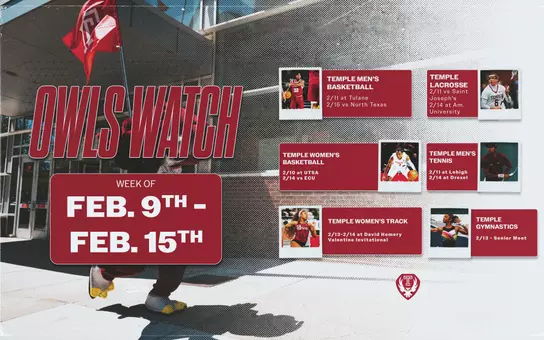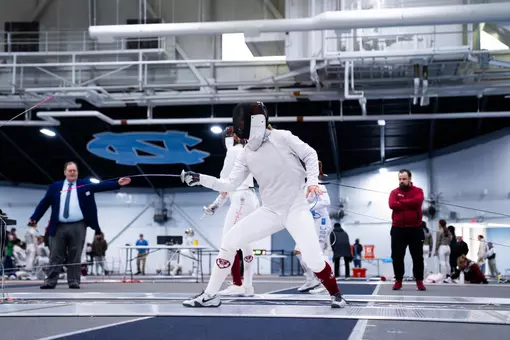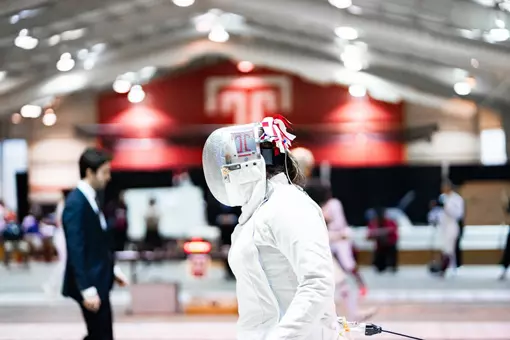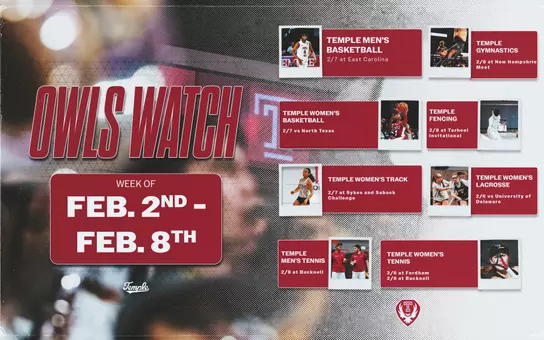Temple University Athletics
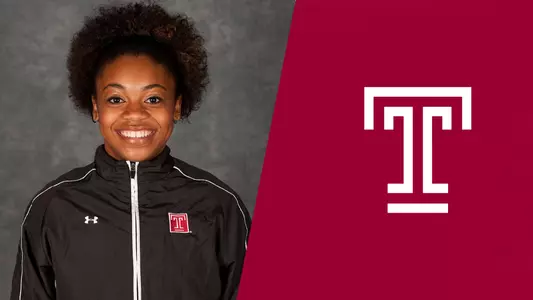
Alumni Spotlight: Dr. Kamali Thompson
11.15.23 | General, Women's Fencing
This is the eighth in a series of spotlights on Temple Athletics alumni and the final one featuring the eight-member 2023 Athletics Hall of Fame Class, which was inducted the weekend of October 6-7.
A two-time recipient of Temple's Female Student-Athlete of the Year, women's fencer Dr. Kamali Thompson is the epitome of a student-athlete. A four-time NCAA Championship qualifier, Thompson earned three top-15 finishes and placed sixth in the sabre her senior season to earn Second Team All-America honors in 2012.
A four-time NIWFA Individual Sabre Title holder, Thompson also finished in the Top 10 at the NCAA Regionals all four years of her career. The 2012 NCAA Woman of the Year nominee held the Temple sabre record for individual career wins (175) from 2012 to 2020.
She also was an alternate for the 2020 USA Olympic team and serve as a physician at Temple Hospital and the Women's Sabre Representative for the USOPC Medical Advisory Committee.
1) Talk about how your career in fencing started?
"I was a dancer growing up and I really wanted to keep dancing. I wanted to open a dance studio and major in dance in college, and (also) be a doctor. So, in eighth grade I was at an open house with my mom, and we were going to the dance room when we saw this fencing demonstration. For whatever reason my mom stuck her head into the room and liked what was going on. My high school coach, a warm and friendly woman, motioned to my mom to come and talk. They had a long conversation. My high school coach's daughter, who was a fencer at Princeton and would go on to win a bronze medal at the Olympics in 2012, was really selling the idea of fencing, especially as a minority woman and how good it would look on my college application. So, my mom was like, 'that's it, you are going to start fencing.'
The plan was never to be competitive enough to fence on the team. The plan was really to fence in high school and have something to add to my college application so it would look more impressive when I applied to schools."
2) How did you arrive at Temple and what was it like competing under legendary coach Dr. Nikki Franke?
"She is a legend. Everyone knows Coach Franke in the fencing community, especially in our (minority) community. So, I joined a club with all the minority fencers, with like 90 percent of black fencers coming from this club in New York City. If you were (a minority) not from the club, you were still affiliated. You were like outside family. Coach Franke was kind of like the aunt of the club so that was the reason I chose to go to Temple.
Once I arrived at Temple I was under her shadow. Besides being a legend, she is also like a family member because my mom and her mom became best friends. It was interesting because I felt like this was an extension of family, with my actual family and my fencing family, so I always felt protected. I always felt I had someone by my side that I could really trust.
College fencing was a whole new arena as I just started fencing nationally the year before. So, when I came to Temple, I was very new to the fencing world. Coach Franke helped me gain confidence. She acknowledged I did not have the experience everyone else had but preached that you overcome that by working harder than everyone else. She saw I needed a little push here and there to stay focused with school or practice a little harder and she always gave that to me when I needed it."
3) You are the only two-time winner of Temple's Student-Athlete of the Year? When you look back now at your college career, what stands out the most?
"I did not expect to win the award the first time and I definitely did not expect to win the second time.
All the amazing women's sabre fencers just happened to be the same class as me. My class had Olympic medalists, one of the greatest sabre fencers of all-time who was in our conference, and I fenced against her the whole time. We also had a few Olympians in the class right above ours and world team members as well. They were such a hard class to compete against and I literally just started fencing two years before.
My freshman and sophomore year I was trying to stay afloat and just do well in whatever capacity that means. Then my junior year came and I kind of got that hang of it. We are fencing five touches and anything can happen in five touches. I felt like I could totally beat some of these girls. My record was 55-7 that year and those seven losses were to just three different opponents. That was so exciting as half the season went by and I was not losing much and it felt great. I was really proud of myself because mentally that was when things shifted for me, and I gained the confidence that I could become good.
Then we got to the NCAAs, and that is the cream of the crop for college fencing. I felt that this was my year to do really well, but I didn't. So that was why I was surprised by the first award.
When senior year came, I told myself I was going to do well at NCAAs because it was my last chance. When I finished sixth at NCAAs, three of the women that did better than me were the Olympians and three below me were Olympic level. It made me feel good that I was able to hang with them."
4) Talk about juggling medical school and competing for your country? How difficult was that?
"It was crazy, even now I do not know how I did it. I think the secret to medical school that most people do not know, because most do not have something that pulls you away from medical school, is that you have to find a way to balance your life so that you can still have the same dedication and passion and not get burnt out. Medical school is really difficult. They want you to basically study 12 hours a day for two straight years and then you go into the hospital and start doing your rotations. I don't think that is feasible, to do really well and stay plugged in 24/7 for two straight years unless you have something else that can help take your mind off it.
It actually helped me that I was fencing because I had to be really diligent with my time. I had to study. I did not have much time for anything else and at the same time I had this amazing stress reliever in fencing which was something very physical and also very mental. Something that could help take my mind off school. On one hand when I think about if I wasn't fencing would I have done better in medical school if I had more time. I don't think so. I think the fact that I was doing something else and had to really focus on both really helped me on both ends."
5) You were an alternate on the 2020 Olympic Team while your brother Kamali competed at the Games for Team USA. How special of a moment was that for you and your family?
"It was a really interesting time because an Olympic year is already hard enough. You have a combination of 12 competitions, eight World Cups, four National competitions to make the team. Every competition you have a numerical value associated with your result. You add all that at the end of the season to determine the top four.
It is stressful as you are going to be up and down with some good competitions and some bad ones. Then I have a brother going through the same thing. We have competitions where I would do well, and he did terribly and vice versa. I was trying to be happy for him while also being happy for myself. It was a rollercoaster. Then we have a pandemic that pops up in the middle of it.
The pandemic came before our last two competitions so that paused us for a year. We must go through the ebbs and flows of those emotions. Finally, we get to the second to last competition of the season where we all pick back up. I had a good competition and did amazingly well, but one of my teammates did better than me and passed me on the points standings which was frustrating but fine as technically we had another competition left. Then because of Covid they cancelled it.
That was incredibly stressful for me because I thought I had another chance (to make the team) and then the World Fencing Organization said you don't.
So, I put my emotions on pause and was happy for my brother who ended up beating the fencer he had to beat at the National competition and made the team which was the happiest moment for our family. I was also so happy for my mom because she juggled this so well."
6) Finally, talk about life coming full circle. You earned your medical degree, and you are now back as an orthopedic surgeon at Temple University Hospital. How does it feel to be retired as a fencer and starting your career medical career?
"It is such a great storybook – I would not say ending because we are far from the end – but I think it is really cool especially with how the matching with hospitals works. Basically, it is like a draft and Temple (Hospital) drafted me. I think it is so cool because look what this University did for my (professional) career and my exposure to this amazing athletic career and now I get to work with athletes. Now I am on the sideline at football games and talking to the fencers. It's amazing to give back to the school that has given so much to me.
Now it's exciting to see where I am I going to go from here! How else is the story going to play on? How else will Temple play pivotal moments in my life? Things literally keep popping up where Temple and I keep meshing together. It is exciting."
A two-time recipient of Temple's Female Student-Athlete of the Year, women's fencer Dr. Kamali Thompson is the epitome of a student-athlete. A four-time NCAA Championship qualifier, Thompson earned three top-15 finishes and placed sixth in the sabre her senior season to earn Second Team All-America honors in 2012.
A four-time NIWFA Individual Sabre Title holder, Thompson also finished in the Top 10 at the NCAA Regionals all four years of her career. The 2012 NCAA Woman of the Year nominee held the Temple sabre record for individual career wins (175) from 2012 to 2020.
She also was an alternate for the 2020 USA Olympic team and serve as a physician at Temple Hospital and the Women's Sabre Representative for the USOPC Medical Advisory Committee.
1) Talk about how your career in fencing started?
"I was a dancer growing up and I really wanted to keep dancing. I wanted to open a dance studio and major in dance in college, and (also) be a doctor. So, in eighth grade I was at an open house with my mom, and we were going to the dance room when we saw this fencing demonstration. For whatever reason my mom stuck her head into the room and liked what was going on. My high school coach, a warm and friendly woman, motioned to my mom to come and talk. They had a long conversation. My high school coach's daughter, who was a fencer at Princeton and would go on to win a bronze medal at the Olympics in 2012, was really selling the idea of fencing, especially as a minority woman and how good it would look on my college application. So, my mom was like, 'that's it, you are going to start fencing.'
The plan was never to be competitive enough to fence on the team. The plan was really to fence in high school and have something to add to my college application so it would look more impressive when I applied to schools."
2) How did you arrive at Temple and what was it like competing under legendary coach Dr. Nikki Franke?
"She is a legend. Everyone knows Coach Franke in the fencing community, especially in our (minority) community. So, I joined a club with all the minority fencers, with like 90 percent of black fencers coming from this club in New York City. If you were (a minority) not from the club, you were still affiliated. You were like outside family. Coach Franke was kind of like the aunt of the club so that was the reason I chose to go to Temple.
Once I arrived at Temple I was under her shadow. Besides being a legend, she is also like a family member because my mom and her mom became best friends. It was interesting because I felt like this was an extension of family, with my actual family and my fencing family, so I always felt protected. I always felt I had someone by my side that I could really trust.
College fencing was a whole new arena as I just started fencing nationally the year before. So, when I came to Temple, I was very new to the fencing world. Coach Franke helped me gain confidence. She acknowledged I did not have the experience everyone else had but preached that you overcome that by working harder than everyone else. She saw I needed a little push here and there to stay focused with school or practice a little harder and she always gave that to me when I needed it."
3) You are the only two-time winner of Temple's Student-Athlete of the Year? When you look back now at your college career, what stands out the most?
"I did not expect to win the award the first time and I definitely did not expect to win the second time.
All the amazing women's sabre fencers just happened to be the same class as me. My class had Olympic medalists, one of the greatest sabre fencers of all-time who was in our conference, and I fenced against her the whole time. We also had a few Olympians in the class right above ours and world team members as well. They were such a hard class to compete against and I literally just started fencing two years before.
My freshman and sophomore year I was trying to stay afloat and just do well in whatever capacity that means. Then my junior year came and I kind of got that hang of it. We are fencing five touches and anything can happen in five touches. I felt like I could totally beat some of these girls. My record was 55-7 that year and those seven losses were to just three different opponents. That was so exciting as half the season went by and I was not losing much and it felt great. I was really proud of myself because mentally that was when things shifted for me, and I gained the confidence that I could become good.
Then we got to the NCAAs, and that is the cream of the crop for college fencing. I felt that this was my year to do really well, but I didn't. So that was why I was surprised by the first award.
When senior year came, I told myself I was going to do well at NCAAs because it was my last chance. When I finished sixth at NCAAs, three of the women that did better than me were the Olympians and three below me were Olympic level. It made me feel good that I was able to hang with them."
4) Talk about juggling medical school and competing for your country? How difficult was that?
"It was crazy, even now I do not know how I did it. I think the secret to medical school that most people do not know, because most do not have something that pulls you away from medical school, is that you have to find a way to balance your life so that you can still have the same dedication and passion and not get burnt out. Medical school is really difficult. They want you to basically study 12 hours a day for two straight years and then you go into the hospital and start doing your rotations. I don't think that is feasible, to do really well and stay plugged in 24/7 for two straight years unless you have something else that can help take your mind off it.
It actually helped me that I was fencing because I had to be really diligent with my time. I had to study. I did not have much time for anything else and at the same time I had this amazing stress reliever in fencing which was something very physical and also very mental. Something that could help take my mind off school. On one hand when I think about if I wasn't fencing would I have done better in medical school if I had more time. I don't think so. I think the fact that I was doing something else and had to really focus on both really helped me on both ends."
5) You were an alternate on the 2020 Olympic Team while your brother Kamali competed at the Games for Team USA. How special of a moment was that for you and your family?
"It was a really interesting time because an Olympic year is already hard enough. You have a combination of 12 competitions, eight World Cups, four National competitions to make the team. Every competition you have a numerical value associated with your result. You add all that at the end of the season to determine the top four.
It is stressful as you are going to be up and down with some good competitions and some bad ones. Then I have a brother going through the same thing. We have competitions where I would do well, and he did terribly and vice versa. I was trying to be happy for him while also being happy for myself. It was a rollercoaster. Then we have a pandemic that pops up in the middle of it.
The pandemic came before our last two competitions so that paused us for a year. We must go through the ebbs and flows of those emotions. Finally, we get to the second to last competition of the season where we all pick back up. I had a good competition and did amazingly well, but one of my teammates did better than me and passed me on the points standings which was frustrating but fine as technically we had another competition left. Then because of Covid they cancelled it.
That was incredibly stressful for me because I thought I had another chance (to make the team) and then the World Fencing Organization said you don't.
So, I put my emotions on pause and was happy for my brother who ended up beating the fencer he had to beat at the National competition and made the team which was the happiest moment for our family. I was also so happy for my mom because she juggled this so well."
6) Finally, talk about life coming full circle. You earned your medical degree, and you are now back as an orthopedic surgeon at Temple University Hospital. How does it feel to be retired as a fencer and starting your career medical career?
"It is such a great storybook – I would not say ending because we are far from the end – but I think it is really cool especially with how the matching with hospitals works. Basically, it is like a draft and Temple (Hospital) drafted me. I think it is so cool because look what this University did for my (professional) career and my exposure to this amazing athletic career and now I get to work with athletes. Now I am on the sideline at football games and talking to the fencers. It's amazing to give back to the school that has given so much to me.
Now it's exciting to see where I am I going to go from here! How else is the story going to play on? How else will Temple play pivotal moments in my life? Things literally keep popping up where Temple and I keep meshing together. It is exciting."
Ep. 36: National Girls & Women in Sports Edition!
Friday, February 06
Temple Men's Basketball 2025-26 All Access | Game 22 WHITE OUT VS USF
Tuesday, February 03
Ep. 35: Football's Peter Clarke & Curly Ordonez
Tuesday, February 03
Ep. 34: Head Fencing Coach Jennie Salmon
Friday, January 30


